Corporate Governance and Stewardship: Theories, Practices, and Values
VerifiedAdded on 2021/06/14
|12
|3429
|166
Essay
AI Summary
This essay provides a comprehensive overview of corporate governance, exploring key theories such as agency theory, stakeholder theory, and resource-dependency theory. It delves into the significance of these theories in managing organizations and maximizing profits. The essay highlights stewardship theory, its application in both for-profit and non-profit organizations, and its contribution to effective governance. Furthermore, it analyzes the relationship between a leader's values and their impact on corporate governance. The study underscores the increasing influence of corporations globally and the necessity of corporate governance to maintain control and ensure ethical practices. The essay examines the roles of stakeholders, including shareholders, board members, employees, and managers, in corporate governance. It also discusses the importance of transparency, security, and accountability as foundational pillars. The essay concludes by emphasizing the importance of a leader's values in guiding an organization towards success.
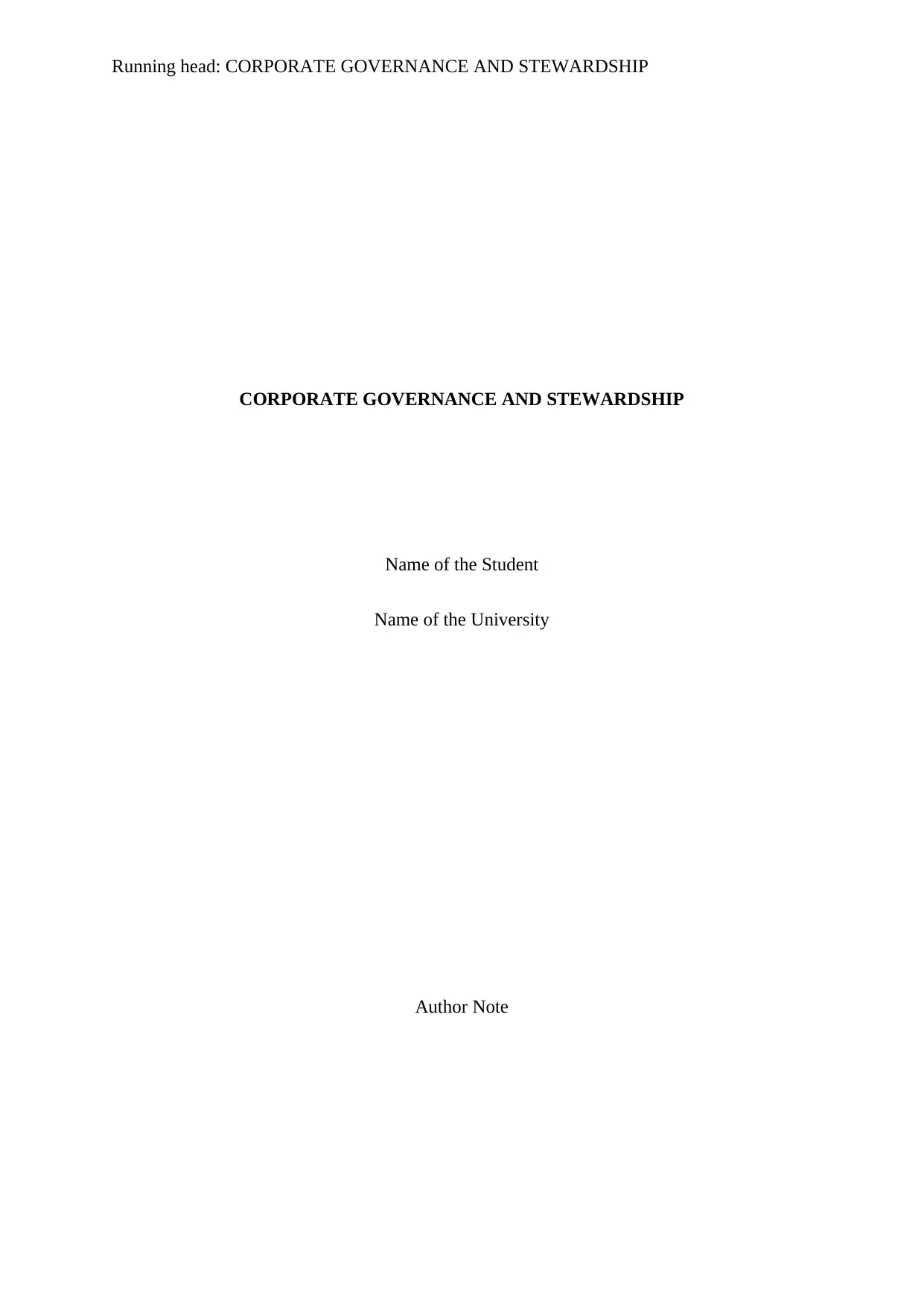
Running head: CORPORATE GOVERNANCE AND STEWARDSHIP
CORPORATE GOVERNANCE AND STEWARDSHIP
Name of the Student
Name of the University
Author Note
CORPORATE GOVERNANCE AND STEWARDSHIP
Name of the Student
Name of the University
Author Note
Paraphrase This Document
Need a fresh take? Get an instant paraphrase of this document with our AI Paraphraser
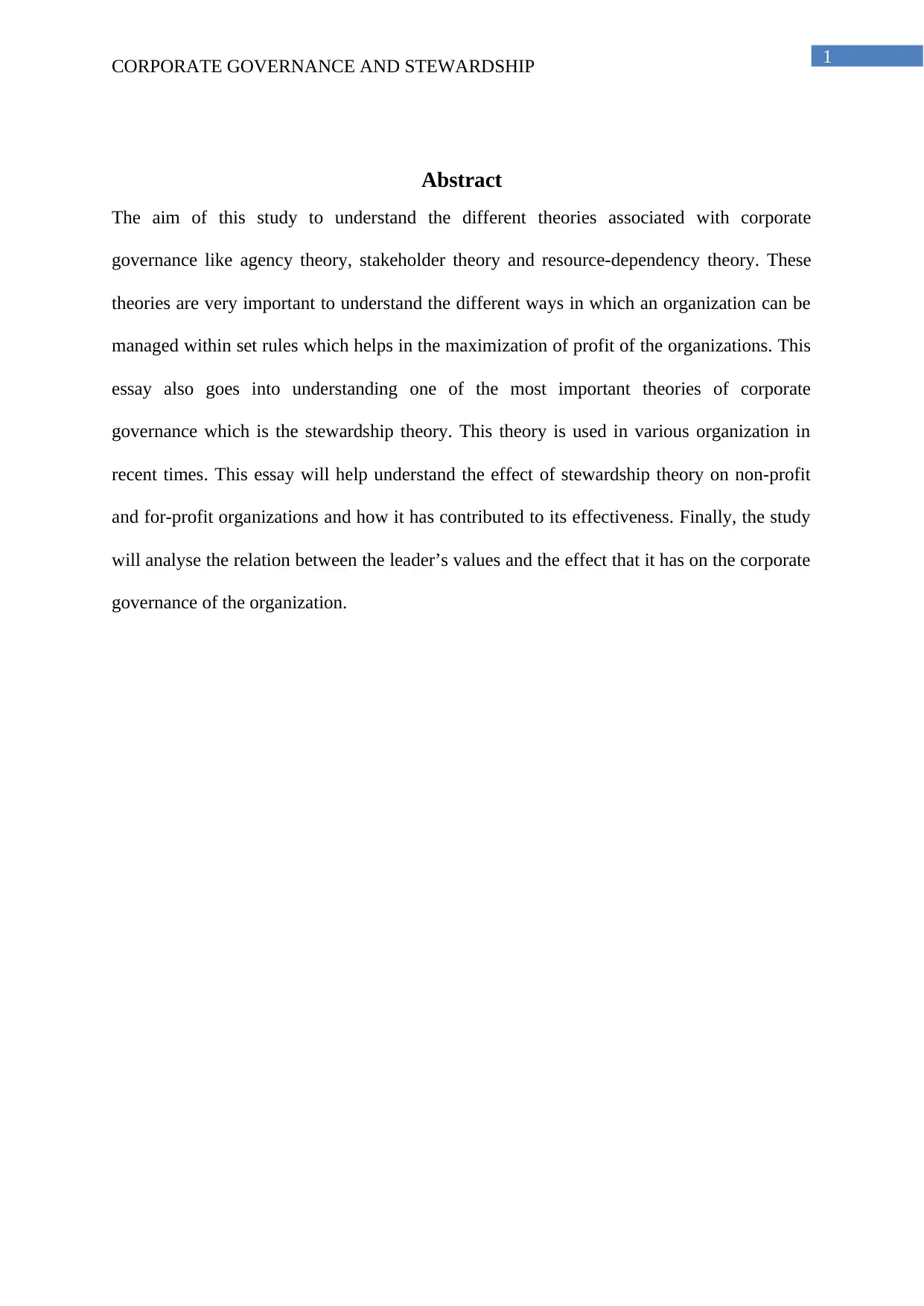
1
CORPORATE GOVERNANCE AND STEWARDSHIP
Abstract
The aim of this study to understand the different theories associated with corporate
governance like agency theory, stakeholder theory and resource-dependency theory. These
theories are very important to understand the different ways in which an organization can be
managed within set rules which helps in the maximization of profit of the organizations. This
essay also goes into understanding one of the most important theories of corporate
governance which is the stewardship theory. This theory is used in various organization in
recent times. This essay will help understand the effect of stewardship theory on non-profit
and for-profit organizations and how it has contributed to its effectiveness. Finally, the study
will analyse the relation between the leader’s values and the effect that it has on the corporate
governance of the organization.
CORPORATE GOVERNANCE AND STEWARDSHIP
Abstract
The aim of this study to understand the different theories associated with corporate
governance like agency theory, stakeholder theory and resource-dependency theory. These
theories are very important to understand the different ways in which an organization can be
managed within set rules which helps in the maximization of profit of the organizations. This
essay also goes into understanding one of the most important theories of corporate
governance which is the stewardship theory. This theory is used in various organization in
recent times. This essay will help understand the effect of stewardship theory on non-profit
and for-profit organizations and how it has contributed to its effectiveness. Finally, the study
will analyse the relation between the leader’s values and the effect that it has on the corporate
governance of the organization.
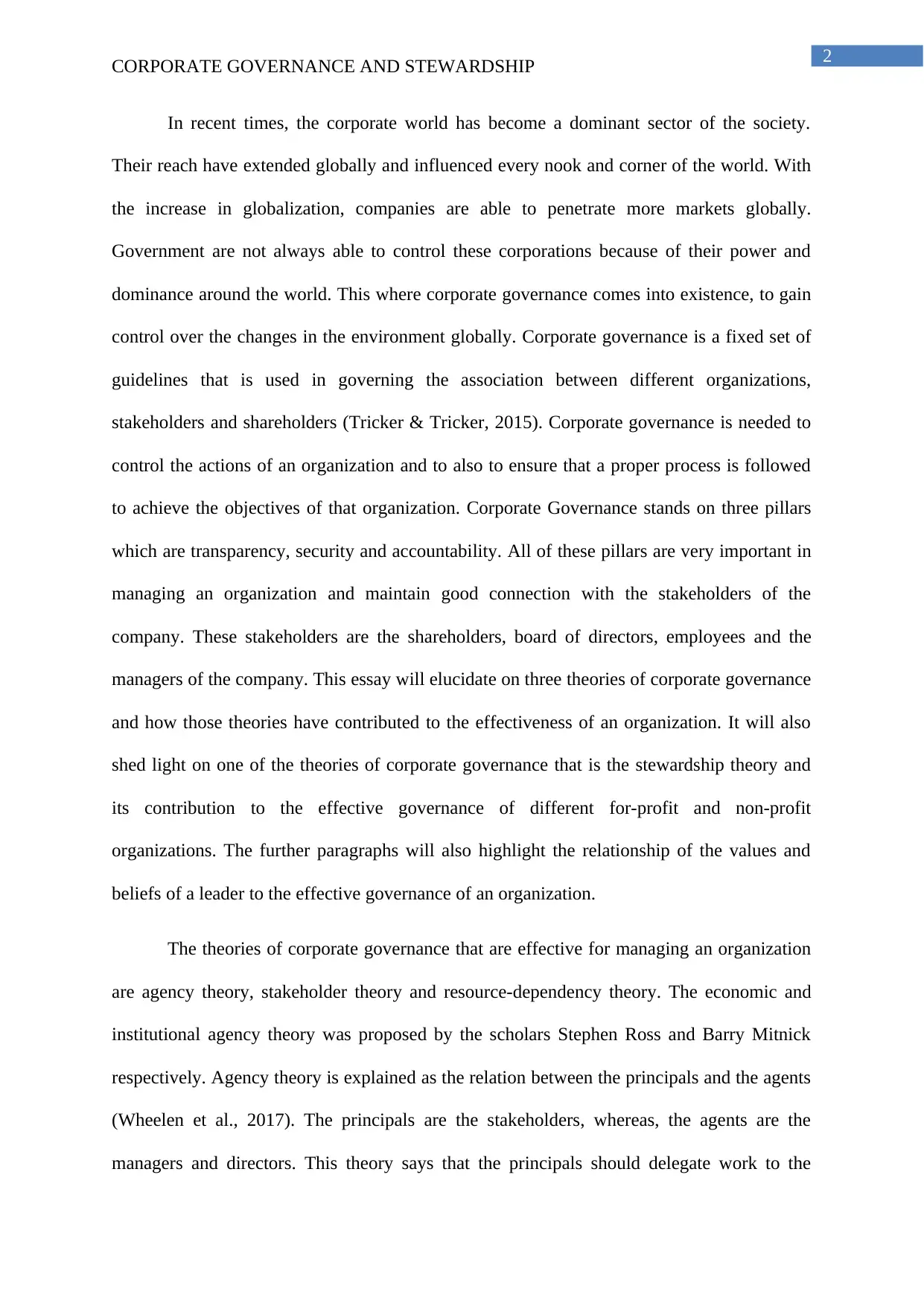
2
CORPORATE GOVERNANCE AND STEWARDSHIP
In recent times, the corporate world has become a dominant sector of the society.
Their reach have extended globally and influenced every nook and corner of the world. With
the increase in globalization, companies are able to penetrate more markets globally.
Government are not always able to control these corporations because of their power and
dominance around the world. This where corporate governance comes into existence, to gain
control over the changes in the environment globally. Corporate governance is a fixed set of
guidelines that is used in governing the association between different organizations,
stakeholders and shareholders (Tricker & Tricker, 2015). Corporate governance is needed to
control the actions of an organization and to also to ensure that a proper process is followed
to achieve the objectives of that organization. Corporate Governance stands on three pillars
which are transparency, security and accountability. All of these pillars are very important in
managing an organization and maintain good connection with the stakeholders of the
company. These stakeholders are the shareholders, board of directors, employees and the
managers of the company. This essay will elucidate on three theories of corporate governance
and how those theories have contributed to the effectiveness of an organization. It will also
shed light on one of the theories of corporate governance that is the stewardship theory and
its contribution to the effective governance of different for-profit and non-profit
organizations. The further paragraphs will also highlight the relationship of the values and
beliefs of a leader to the effective governance of an organization.
The theories of corporate governance that are effective for managing an organization
are agency theory, stakeholder theory and resource-dependency theory. The economic and
institutional agency theory was proposed by the scholars Stephen Ross and Barry Mitnick
respectively. Agency theory is explained as the relation between the principals and the agents
(Wheelen et al., 2017). The principals are the stakeholders, whereas, the agents are the
managers and directors. This theory says that the principals should delegate work to the
CORPORATE GOVERNANCE AND STEWARDSHIP
In recent times, the corporate world has become a dominant sector of the society.
Their reach have extended globally and influenced every nook and corner of the world. With
the increase in globalization, companies are able to penetrate more markets globally.
Government are not always able to control these corporations because of their power and
dominance around the world. This where corporate governance comes into existence, to gain
control over the changes in the environment globally. Corporate governance is a fixed set of
guidelines that is used in governing the association between different organizations,
stakeholders and shareholders (Tricker & Tricker, 2015). Corporate governance is needed to
control the actions of an organization and to also to ensure that a proper process is followed
to achieve the objectives of that organization. Corporate Governance stands on three pillars
which are transparency, security and accountability. All of these pillars are very important in
managing an organization and maintain good connection with the stakeholders of the
company. These stakeholders are the shareholders, board of directors, employees and the
managers of the company. This essay will elucidate on three theories of corporate governance
and how those theories have contributed to the effectiveness of an organization. It will also
shed light on one of the theories of corporate governance that is the stewardship theory and
its contribution to the effective governance of different for-profit and non-profit
organizations. The further paragraphs will also highlight the relationship of the values and
beliefs of a leader to the effective governance of an organization.
The theories of corporate governance that are effective for managing an organization
are agency theory, stakeholder theory and resource-dependency theory. The economic and
institutional agency theory was proposed by the scholars Stephen Ross and Barry Mitnick
respectively. Agency theory is explained as the relation between the principals and the agents
(Wheelen et al., 2017). The principals are the stakeholders, whereas, the agents are the
managers and directors. This theory says that the principals should delegate work to the
⊘ This is a preview!⊘
Do you want full access?
Subscribe today to unlock all pages.

Trusted by 1+ million students worldwide
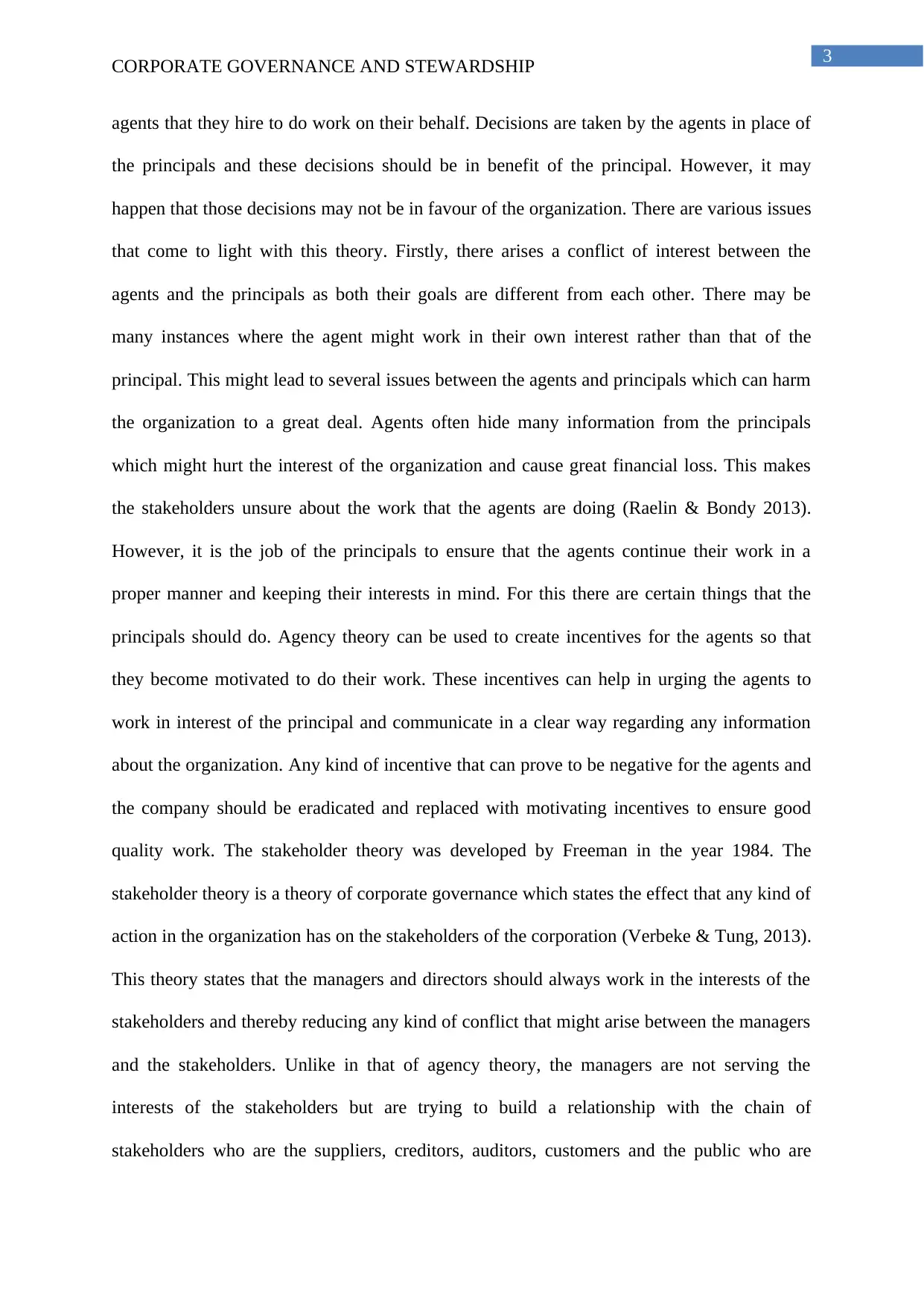
3
CORPORATE GOVERNANCE AND STEWARDSHIP
agents that they hire to do work on their behalf. Decisions are taken by the agents in place of
the principals and these decisions should be in benefit of the principal. However, it may
happen that those decisions may not be in favour of the organization. There are various issues
that come to light with this theory. Firstly, there arises a conflict of interest between the
agents and the principals as both their goals are different from each other. There may be
many instances where the agent might work in their own interest rather than that of the
principal. This might lead to several issues between the agents and principals which can harm
the organization to a great deal. Agents often hide many information from the principals
which might hurt the interest of the organization and cause great financial loss. This makes
the stakeholders unsure about the work that the agents are doing (Raelin & Bondy 2013).
However, it is the job of the principals to ensure that the agents continue their work in a
proper manner and keeping their interests in mind. For this there are certain things that the
principals should do. Agency theory can be used to create incentives for the agents so that
they become motivated to do their work. These incentives can help in urging the agents to
work in interest of the principal and communicate in a clear way regarding any information
about the organization. Any kind of incentive that can prove to be negative for the agents and
the company should be eradicated and replaced with motivating incentives to ensure good
quality work. The stakeholder theory was developed by Freeman in the year 1984. The
stakeholder theory is a theory of corporate governance which states the effect that any kind of
action in the organization has on the stakeholders of the corporation (Verbeke & Tung, 2013).
This theory states that the managers and directors should always work in the interests of the
stakeholders and thereby reducing any kind of conflict that might arise between the managers
and the stakeholders. Unlike in that of agency theory, the managers are not serving the
interests of the stakeholders but are trying to build a relationship with the chain of
stakeholders who are the suppliers, creditors, auditors, customers and the public who are
CORPORATE GOVERNANCE AND STEWARDSHIP
agents that they hire to do work on their behalf. Decisions are taken by the agents in place of
the principals and these decisions should be in benefit of the principal. However, it may
happen that those decisions may not be in favour of the organization. There are various issues
that come to light with this theory. Firstly, there arises a conflict of interest between the
agents and the principals as both their goals are different from each other. There may be
many instances where the agent might work in their own interest rather than that of the
principal. This might lead to several issues between the agents and principals which can harm
the organization to a great deal. Agents often hide many information from the principals
which might hurt the interest of the organization and cause great financial loss. This makes
the stakeholders unsure about the work that the agents are doing (Raelin & Bondy 2013).
However, it is the job of the principals to ensure that the agents continue their work in a
proper manner and keeping their interests in mind. For this there are certain things that the
principals should do. Agency theory can be used to create incentives for the agents so that
they become motivated to do their work. These incentives can help in urging the agents to
work in interest of the principal and communicate in a clear way regarding any information
about the organization. Any kind of incentive that can prove to be negative for the agents and
the company should be eradicated and replaced with motivating incentives to ensure good
quality work. The stakeholder theory was developed by Freeman in the year 1984. The
stakeholder theory is a theory of corporate governance which states the effect that any kind of
action in the organization has on the stakeholders of the corporation (Verbeke & Tung, 2013).
This theory states that the managers and directors should always work in the interests of the
stakeholders and thereby reducing any kind of conflict that might arise between the managers
and the stakeholders. Unlike in that of agency theory, the managers are not serving the
interests of the stakeholders but are trying to build a relationship with the chain of
stakeholders who are the suppliers, creditors, auditors, customers and the public who are
Paraphrase This Document
Need a fresh take? Get an instant paraphrase of this document with our AI Paraphraser
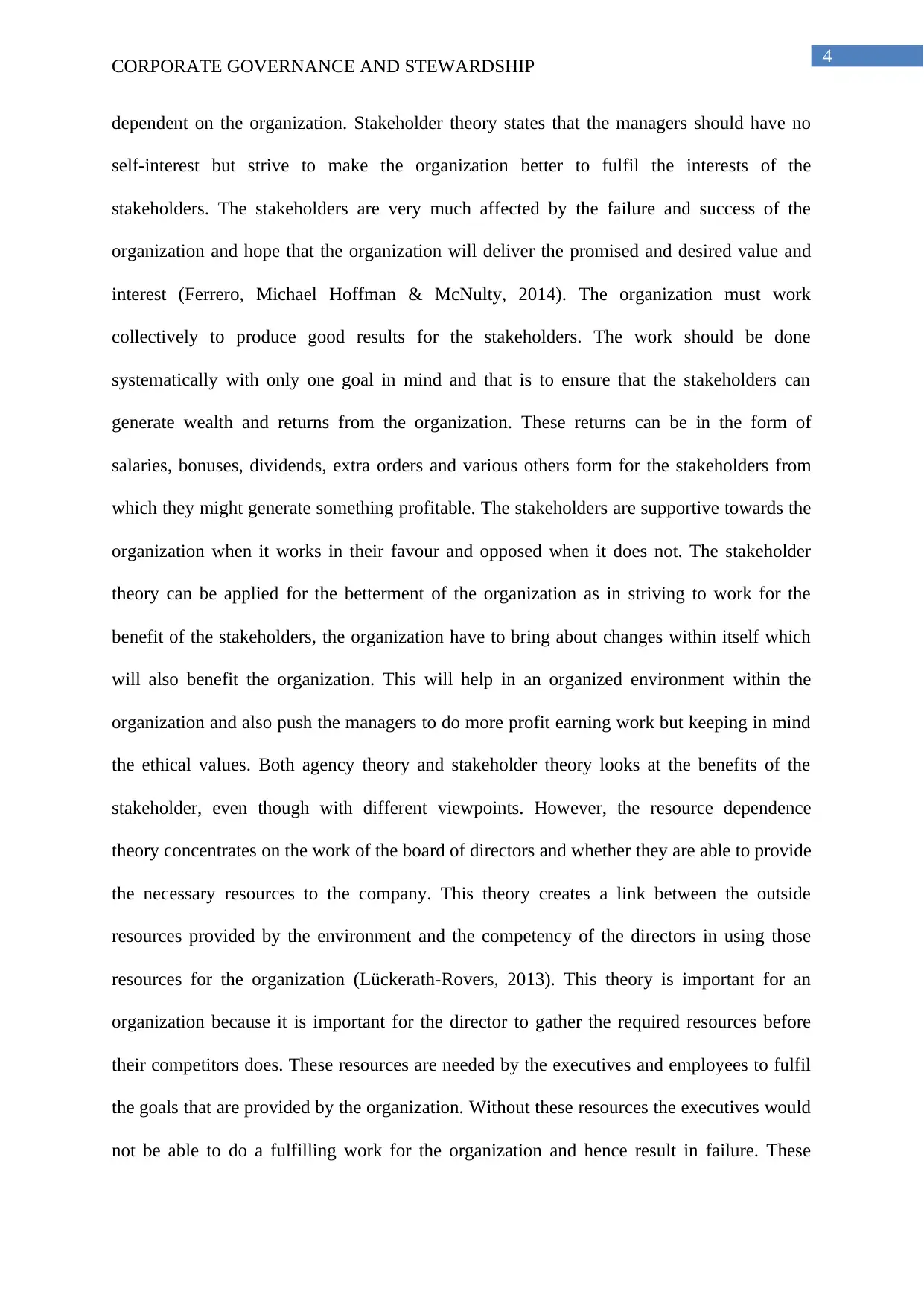
4
CORPORATE GOVERNANCE AND STEWARDSHIP
dependent on the organization. Stakeholder theory states that the managers should have no
self-interest but strive to make the organization better to fulfil the interests of the
stakeholders. The stakeholders are very much affected by the failure and success of the
organization and hope that the organization will deliver the promised and desired value and
interest (Ferrero, Michael Hoffman & McNulty, 2014). The organization must work
collectively to produce good results for the stakeholders. The work should be done
systematically with only one goal in mind and that is to ensure that the stakeholders can
generate wealth and returns from the organization. These returns can be in the form of
salaries, bonuses, dividends, extra orders and various others form for the stakeholders from
which they might generate something profitable. The stakeholders are supportive towards the
organization when it works in their favour and opposed when it does not. The stakeholder
theory can be applied for the betterment of the organization as in striving to work for the
benefit of the stakeholders, the organization have to bring about changes within itself which
will also benefit the organization. This will help in an organized environment within the
organization and also push the managers to do more profit earning work but keeping in mind
the ethical values. Both agency theory and stakeholder theory looks at the benefits of the
stakeholder, even though with different viewpoints. However, the resource dependence
theory concentrates on the work of the board of directors and whether they are able to provide
the necessary resources to the company. This theory creates a link between the outside
resources provided by the environment and the competency of the directors in using those
resources for the organization (Lückerath-Rovers, 2013). This theory is important for an
organization because it is important for the director to gather the required resources before
their competitors does. These resources are needed by the executives and employees to fulfil
the goals that are provided by the organization. Without these resources the executives would
not be able to do a fulfilling work for the organization and hence result in failure. These
CORPORATE GOVERNANCE AND STEWARDSHIP
dependent on the organization. Stakeholder theory states that the managers should have no
self-interest but strive to make the organization better to fulfil the interests of the
stakeholders. The stakeholders are very much affected by the failure and success of the
organization and hope that the organization will deliver the promised and desired value and
interest (Ferrero, Michael Hoffman & McNulty, 2014). The organization must work
collectively to produce good results for the stakeholders. The work should be done
systematically with only one goal in mind and that is to ensure that the stakeholders can
generate wealth and returns from the organization. These returns can be in the form of
salaries, bonuses, dividends, extra orders and various others form for the stakeholders from
which they might generate something profitable. The stakeholders are supportive towards the
organization when it works in their favour and opposed when it does not. The stakeholder
theory can be applied for the betterment of the organization as in striving to work for the
benefit of the stakeholders, the organization have to bring about changes within itself which
will also benefit the organization. This will help in an organized environment within the
organization and also push the managers to do more profit earning work but keeping in mind
the ethical values. Both agency theory and stakeholder theory looks at the benefits of the
stakeholder, even though with different viewpoints. However, the resource dependence
theory concentrates on the work of the board of directors and whether they are able to provide
the necessary resources to the company. This theory creates a link between the outside
resources provided by the environment and the competency of the directors in using those
resources for the organization (Lückerath-Rovers, 2013). This theory is important for an
organization because it is important for the director to gather the required resources before
their competitors does. These resources are needed by the executives and employees to fulfil
the goals that are provided by the organization. Without these resources the executives would
not be able to do a fulfilling work for the organization and hence result in failure. These
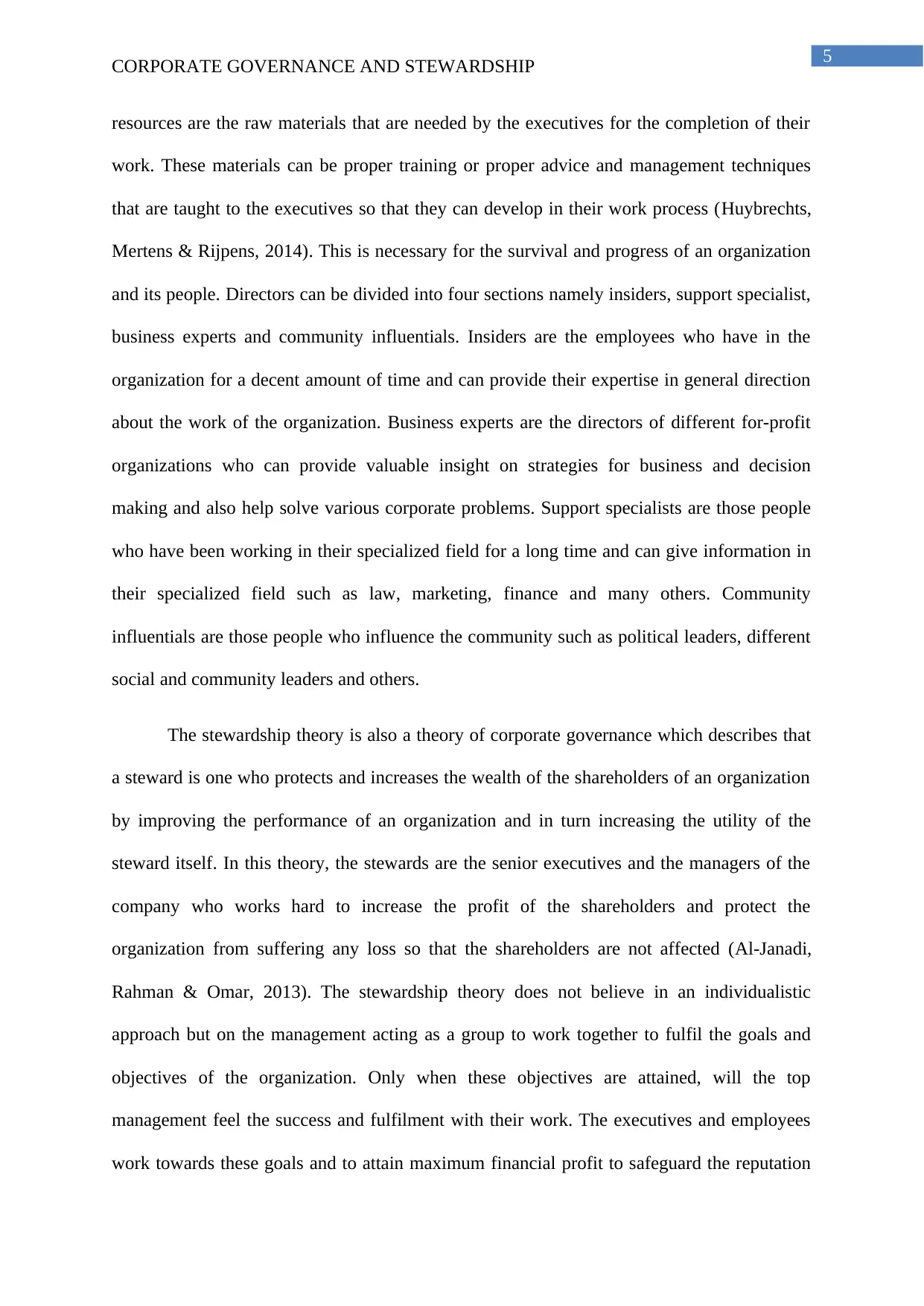
5
CORPORATE GOVERNANCE AND STEWARDSHIP
resources are the raw materials that are needed by the executives for the completion of their
work. These materials can be proper training or proper advice and management techniques
that are taught to the executives so that they can develop in their work process (Huybrechts,
Mertens & Rijpens, 2014). This is necessary for the survival and progress of an organization
and its people. Directors can be divided into four sections namely insiders, support specialist,
business experts and community influentials. Insiders are the employees who have in the
organization for a decent amount of time and can provide their expertise in general direction
about the work of the organization. Business experts are the directors of different for-profit
organizations who can provide valuable insight on strategies for business and decision
making and also help solve various corporate problems. Support specialists are those people
who have been working in their specialized field for a long time and can give information in
their specialized field such as law, marketing, finance and many others. Community
influentials are those people who influence the community such as political leaders, different
social and community leaders and others.
The stewardship theory is also a theory of corporate governance which describes that
a steward is one who protects and increases the wealth of the shareholders of an organization
by improving the performance of an organization and in turn increasing the utility of the
steward itself. In this theory, the stewards are the senior executives and the managers of the
company who works hard to increase the profit of the shareholders and protect the
organization from suffering any loss so that the shareholders are not affected (Al-Janadi,
Rahman & Omar, 2013). The stewardship theory does not believe in an individualistic
approach but on the management acting as a group to work together to fulfil the goals and
objectives of the organization. Only when these objectives are attained, will the top
management feel the success and fulfilment with their work. The executives and employees
work towards these goals and to attain maximum financial profit to safeguard the reputation
CORPORATE GOVERNANCE AND STEWARDSHIP
resources are the raw materials that are needed by the executives for the completion of their
work. These materials can be proper training or proper advice and management techniques
that are taught to the executives so that they can develop in their work process (Huybrechts,
Mertens & Rijpens, 2014). This is necessary for the survival and progress of an organization
and its people. Directors can be divided into four sections namely insiders, support specialist,
business experts and community influentials. Insiders are the employees who have in the
organization for a decent amount of time and can provide their expertise in general direction
about the work of the organization. Business experts are the directors of different for-profit
organizations who can provide valuable insight on strategies for business and decision
making and also help solve various corporate problems. Support specialists are those people
who have been working in their specialized field for a long time and can give information in
their specialized field such as law, marketing, finance and many others. Community
influentials are those people who influence the community such as political leaders, different
social and community leaders and others.
The stewardship theory is also a theory of corporate governance which describes that
a steward is one who protects and increases the wealth of the shareholders of an organization
by improving the performance of an organization and in turn increasing the utility of the
steward itself. In this theory, the stewards are the senior executives and the managers of the
company who works hard to increase the profit of the shareholders and protect the
organization from suffering any loss so that the shareholders are not affected (Al-Janadi,
Rahman & Omar, 2013). The stewardship theory does not believe in an individualistic
approach but on the management acting as a group to work together to fulfil the goals and
objectives of the organization. Only when these objectives are attained, will the top
management feel the success and fulfilment with their work. The executives and employees
work towards these goals and to attain maximum financial profit to safeguard the reputation
⊘ This is a preview!⊘
Do you want full access?
Subscribe today to unlock all pages.

Trusted by 1+ million students worldwide
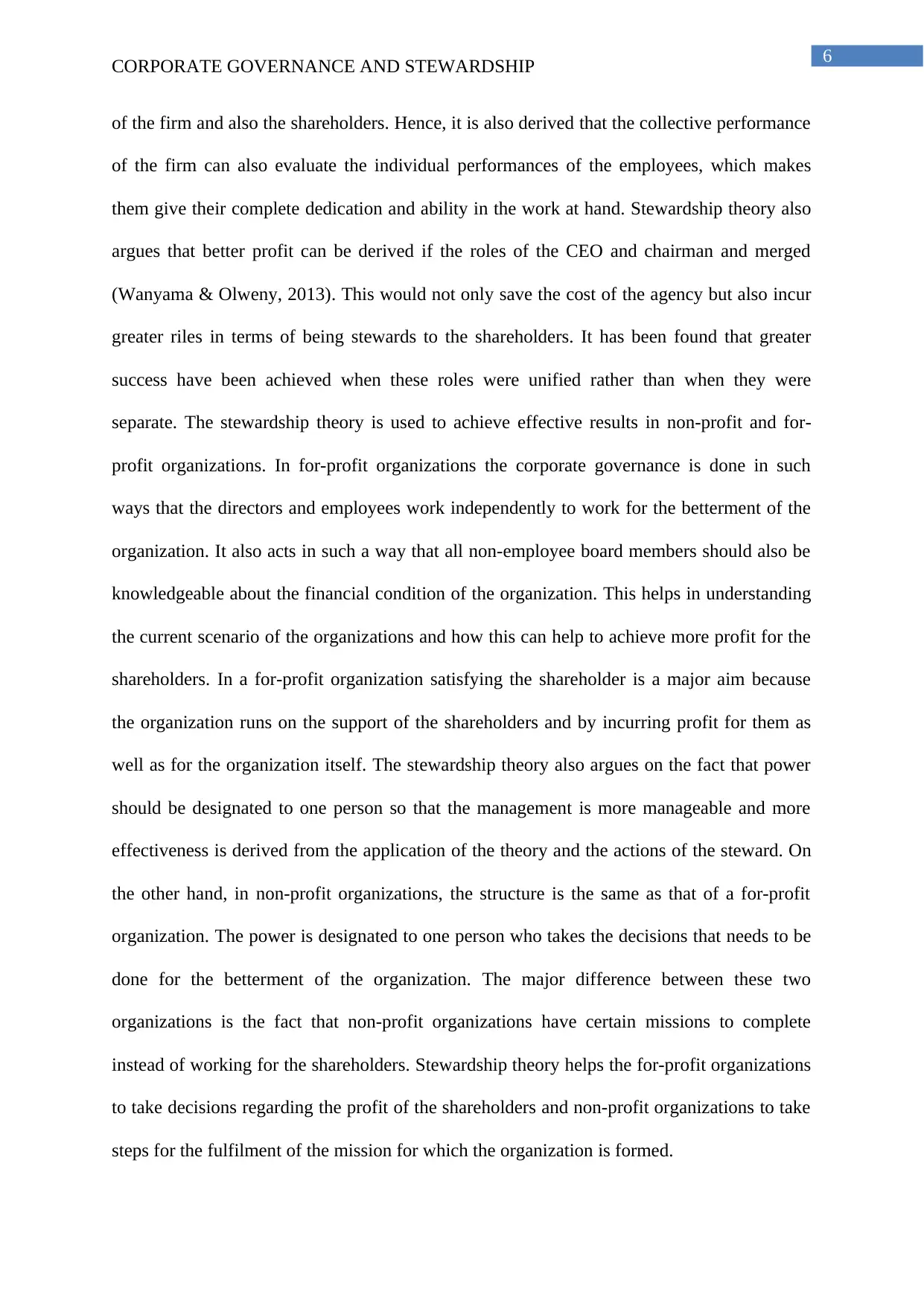
6
CORPORATE GOVERNANCE AND STEWARDSHIP
of the firm and also the shareholders. Hence, it is also derived that the collective performance
of the firm can also evaluate the individual performances of the employees, which makes
them give their complete dedication and ability in the work at hand. Stewardship theory also
argues that better profit can be derived if the roles of the CEO and chairman and merged
(Wanyama & Olweny, 2013). This would not only save the cost of the agency but also incur
greater riles in terms of being stewards to the shareholders. It has been found that greater
success have been achieved when these roles were unified rather than when they were
separate. The stewardship theory is used to achieve effective results in non-profit and for-
profit organizations. In for-profit organizations the corporate governance is done in such
ways that the directors and employees work independently to work for the betterment of the
organization. It also acts in such a way that all non-employee board members should also be
knowledgeable about the financial condition of the organization. This helps in understanding
the current scenario of the organizations and how this can help to achieve more profit for the
shareholders. In a for-profit organization satisfying the shareholder is a major aim because
the organization runs on the support of the shareholders and by incurring profit for them as
well as for the organization itself. The stewardship theory also argues on the fact that power
should be designated to one person so that the management is more manageable and more
effectiveness is derived from the application of the theory and the actions of the steward. On
the other hand, in non-profit organizations, the structure is the same as that of a for-profit
organization. The power is designated to one person who takes the decisions that needs to be
done for the betterment of the organization. The major difference between these two
organizations is the fact that non-profit organizations have certain missions to complete
instead of working for the shareholders. Stewardship theory helps the for-profit organizations
to take decisions regarding the profit of the shareholders and non-profit organizations to take
steps for the fulfilment of the mission for which the organization is formed.
CORPORATE GOVERNANCE AND STEWARDSHIP
of the firm and also the shareholders. Hence, it is also derived that the collective performance
of the firm can also evaluate the individual performances of the employees, which makes
them give their complete dedication and ability in the work at hand. Stewardship theory also
argues that better profit can be derived if the roles of the CEO and chairman and merged
(Wanyama & Olweny, 2013). This would not only save the cost of the agency but also incur
greater riles in terms of being stewards to the shareholders. It has been found that greater
success have been achieved when these roles were unified rather than when they were
separate. The stewardship theory is used to achieve effective results in non-profit and for-
profit organizations. In for-profit organizations the corporate governance is done in such
ways that the directors and employees work independently to work for the betterment of the
organization. It also acts in such a way that all non-employee board members should also be
knowledgeable about the financial condition of the organization. This helps in understanding
the current scenario of the organizations and how this can help to achieve more profit for the
shareholders. In a for-profit organization satisfying the shareholder is a major aim because
the organization runs on the support of the shareholders and by incurring profit for them as
well as for the organization itself. The stewardship theory also argues on the fact that power
should be designated to one person so that the management is more manageable and more
effectiveness is derived from the application of the theory and the actions of the steward. On
the other hand, in non-profit organizations, the structure is the same as that of a for-profit
organization. The power is designated to one person who takes the decisions that needs to be
done for the betterment of the organization. The major difference between these two
organizations is the fact that non-profit organizations have certain missions to complete
instead of working for the shareholders. Stewardship theory helps the for-profit organizations
to take decisions regarding the profit of the shareholders and non-profit organizations to take
steps for the fulfilment of the mission for which the organization is formed.
Paraphrase This Document
Need a fresh take? Get an instant paraphrase of this document with our AI Paraphraser
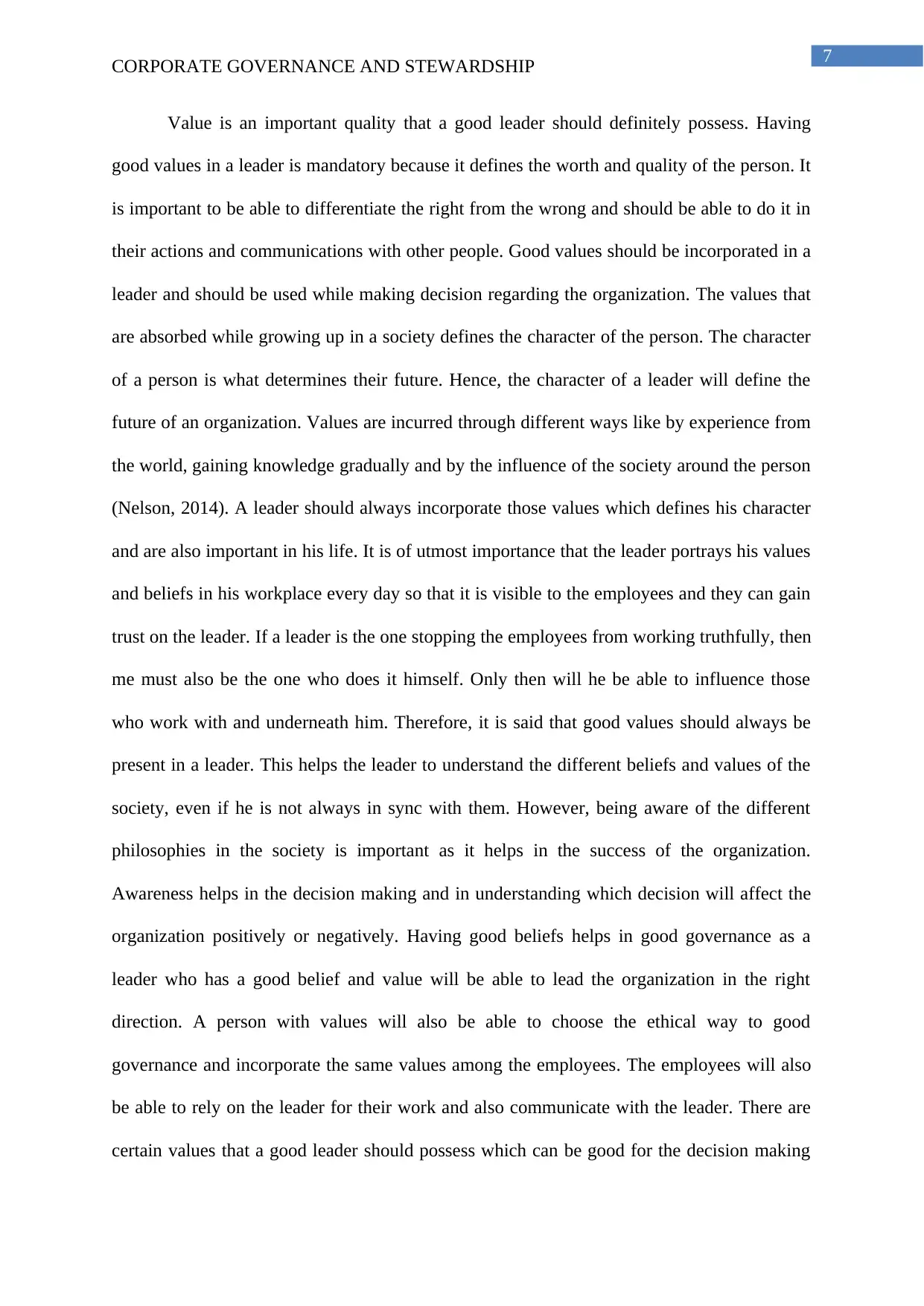
7
CORPORATE GOVERNANCE AND STEWARDSHIP
Value is an important quality that a good leader should definitely possess. Having
good values in a leader is mandatory because it defines the worth and quality of the person. It
is important to be able to differentiate the right from the wrong and should be able to do it in
their actions and communications with other people. Good values should be incorporated in a
leader and should be used while making decision regarding the organization. The values that
are absorbed while growing up in a society defines the character of the person. The character
of a person is what determines their future. Hence, the character of a leader will define the
future of an organization. Values are incurred through different ways like by experience from
the world, gaining knowledge gradually and by the influence of the society around the person
(Nelson, 2014). A leader should always incorporate those values which defines his character
and are also important in his life. It is of utmost importance that the leader portrays his values
and beliefs in his workplace every day so that it is visible to the employees and they can gain
trust on the leader. If a leader is the one stopping the employees from working truthfully, then
me must also be the one who does it himself. Only then will he be able to influence those
who work with and underneath him. Therefore, it is said that good values should always be
present in a leader. This helps the leader to understand the different beliefs and values of the
society, even if he is not always in sync with them. However, being aware of the different
philosophies in the society is important as it helps in the success of the organization.
Awareness helps in the decision making and in understanding which decision will affect the
organization positively or negatively. Having good beliefs helps in good governance as a
leader who has a good belief and value will be able to lead the organization in the right
direction. A person with values will also be able to choose the ethical way to good
governance and incorporate the same values among the employees. The employees will also
be able to rely on the leader for their work and also communicate with the leader. There are
certain values that a good leader should possess which can be good for the decision making
CORPORATE GOVERNANCE AND STEWARDSHIP
Value is an important quality that a good leader should definitely possess. Having
good values in a leader is mandatory because it defines the worth and quality of the person. It
is important to be able to differentiate the right from the wrong and should be able to do it in
their actions and communications with other people. Good values should be incorporated in a
leader and should be used while making decision regarding the organization. The values that
are absorbed while growing up in a society defines the character of the person. The character
of a person is what determines their future. Hence, the character of a leader will define the
future of an organization. Values are incurred through different ways like by experience from
the world, gaining knowledge gradually and by the influence of the society around the person
(Nelson, 2014). A leader should always incorporate those values which defines his character
and are also important in his life. It is of utmost importance that the leader portrays his values
and beliefs in his workplace every day so that it is visible to the employees and they can gain
trust on the leader. If a leader is the one stopping the employees from working truthfully, then
me must also be the one who does it himself. Only then will he be able to influence those
who work with and underneath him. Therefore, it is said that good values should always be
present in a leader. This helps the leader to understand the different beliefs and values of the
society, even if he is not always in sync with them. However, being aware of the different
philosophies in the society is important as it helps in the success of the organization.
Awareness helps in the decision making and in understanding which decision will affect the
organization positively or negatively. Having good beliefs helps in good governance as a
leader who has a good belief and value will be able to lead the organization in the right
direction. A person with values will also be able to choose the ethical way to good
governance and incorporate the same values among the employees. The employees will also
be able to rely on the leader for their work and also communicate with the leader. There are
certain values that a good leader should possess which can be good for the decision making
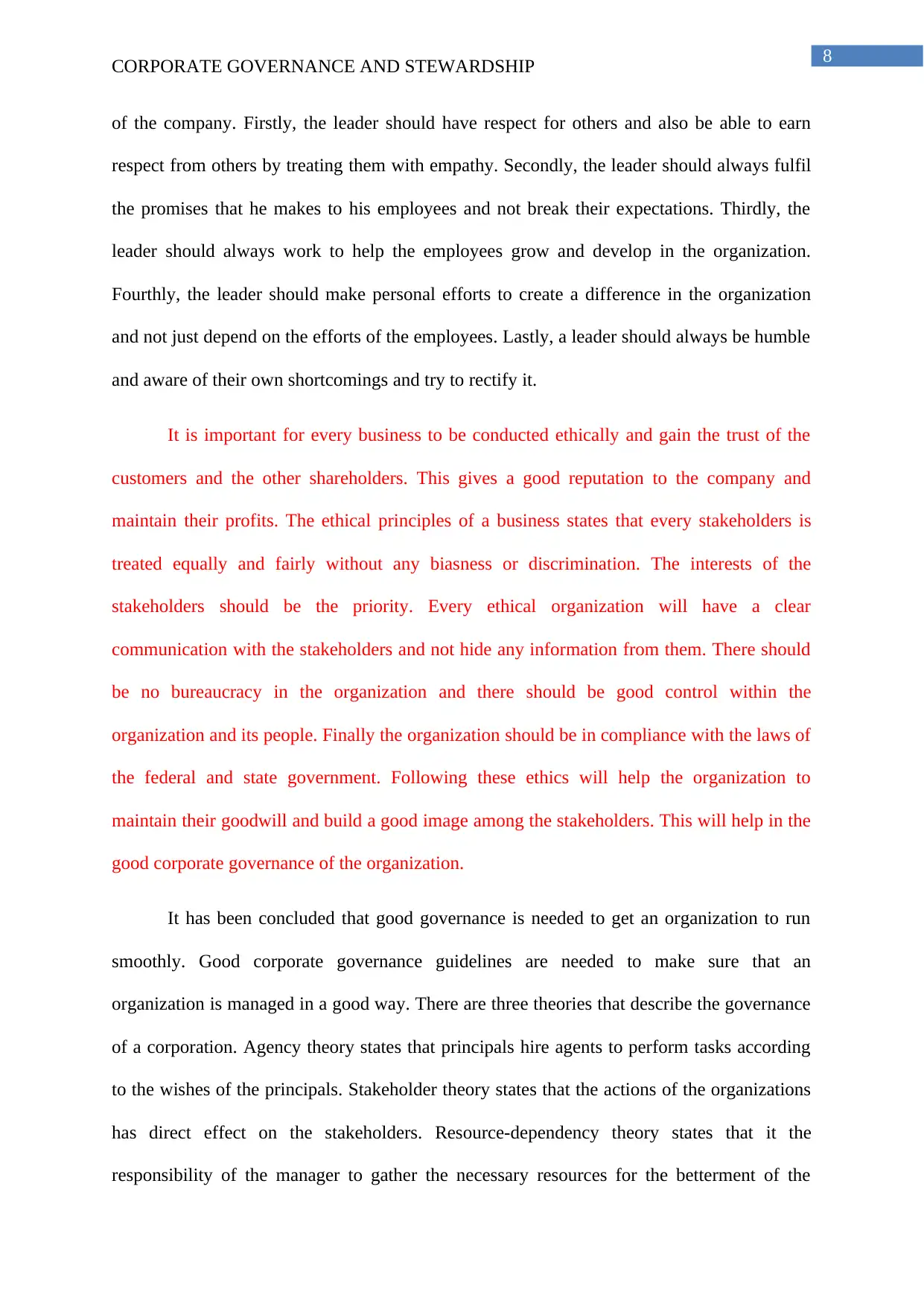
8
CORPORATE GOVERNANCE AND STEWARDSHIP
of the company. Firstly, the leader should have respect for others and also be able to earn
respect from others by treating them with empathy. Secondly, the leader should always fulfil
the promises that he makes to his employees and not break their expectations. Thirdly, the
leader should always work to help the employees grow and develop in the organization.
Fourthly, the leader should make personal efforts to create a difference in the organization
and not just depend on the efforts of the employees. Lastly, a leader should always be humble
and aware of their own shortcomings and try to rectify it.
It is important for every business to be conducted ethically and gain the trust of the
customers and the other shareholders. This gives a good reputation to the company and
maintain their profits. The ethical principles of a business states that every stakeholders is
treated equally and fairly without any biasness or discrimination. The interests of the
stakeholders should be the priority. Every ethical organization will have a clear
communication with the stakeholders and not hide any information from them. There should
be no bureaucracy in the organization and there should be good control within the
organization and its people. Finally the organization should be in compliance with the laws of
the federal and state government. Following these ethics will help the organization to
maintain their goodwill and build a good image among the stakeholders. This will help in the
good corporate governance of the organization.
It has been concluded that good governance is needed to get an organization to run
smoothly. Good corporate governance guidelines are needed to make sure that an
organization is managed in a good way. There are three theories that describe the governance
of a corporation. Agency theory states that principals hire agents to perform tasks according
to the wishes of the principals. Stakeholder theory states that the actions of the organizations
has direct effect on the stakeholders. Resource-dependency theory states that it the
responsibility of the manager to gather the necessary resources for the betterment of the
CORPORATE GOVERNANCE AND STEWARDSHIP
of the company. Firstly, the leader should have respect for others and also be able to earn
respect from others by treating them with empathy. Secondly, the leader should always fulfil
the promises that he makes to his employees and not break their expectations. Thirdly, the
leader should always work to help the employees grow and develop in the organization.
Fourthly, the leader should make personal efforts to create a difference in the organization
and not just depend on the efforts of the employees. Lastly, a leader should always be humble
and aware of their own shortcomings and try to rectify it.
It is important for every business to be conducted ethically and gain the trust of the
customers and the other shareholders. This gives a good reputation to the company and
maintain their profits. The ethical principles of a business states that every stakeholders is
treated equally and fairly without any biasness or discrimination. The interests of the
stakeholders should be the priority. Every ethical organization will have a clear
communication with the stakeholders and not hide any information from them. There should
be no bureaucracy in the organization and there should be good control within the
organization and its people. Finally the organization should be in compliance with the laws of
the federal and state government. Following these ethics will help the organization to
maintain their goodwill and build a good image among the stakeholders. This will help in the
good corporate governance of the organization.
It has been concluded that good governance is needed to get an organization to run
smoothly. Good corporate governance guidelines are needed to make sure that an
organization is managed in a good way. There are three theories that describe the governance
of a corporation. Agency theory states that principals hire agents to perform tasks according
to the wishes of the principals. Stakeholder theory states that the actions of the organizations
has direct effect on the stakeholders. Resource-dependency theory states that it the
responsibility of the manager to gather the necessary resources for the betterment of the
⊘ This is a preview!⊘
Do you want full access?
Subscribe today to unlock all pages.

Trusted by 1+ million students worldwide
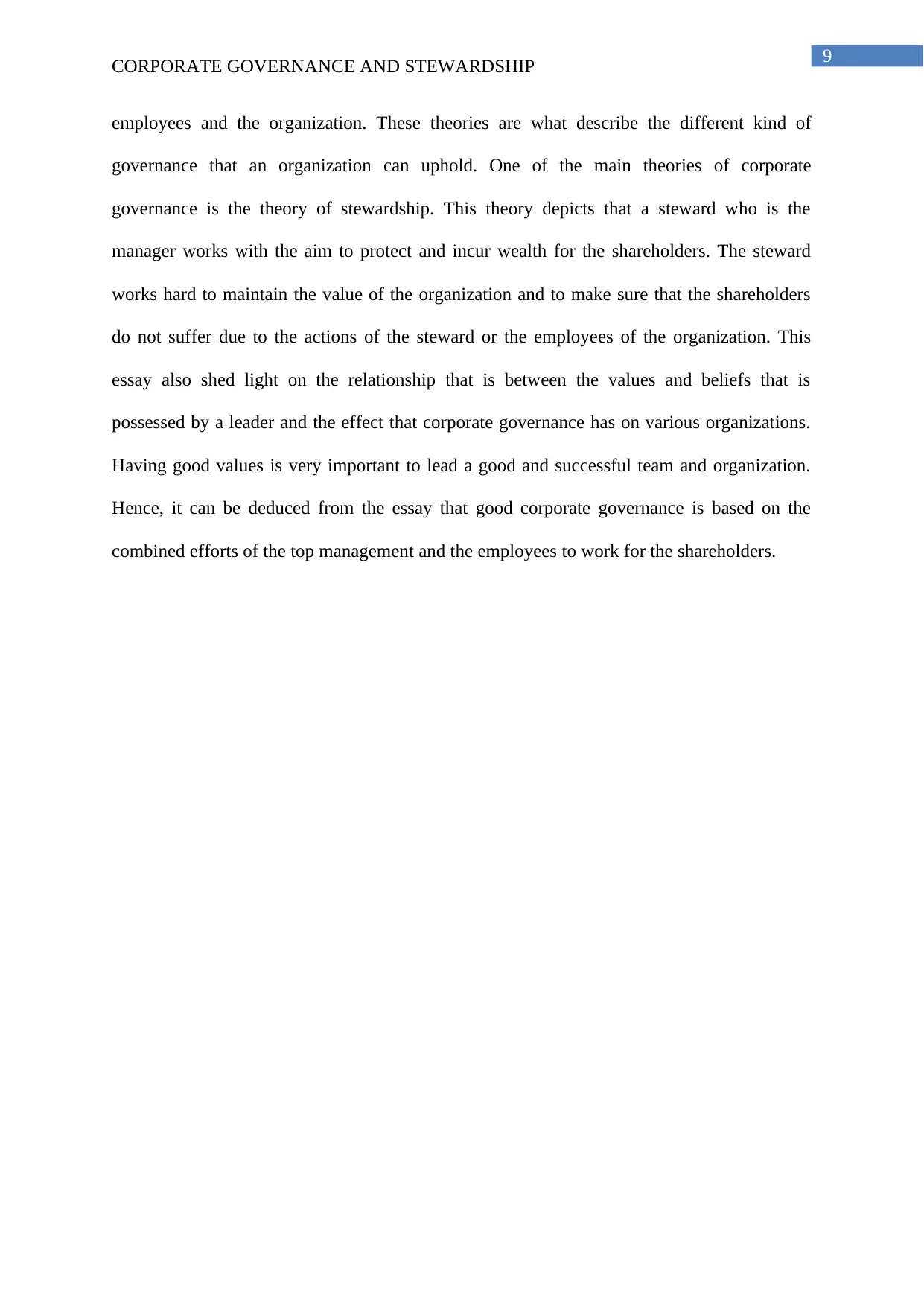
9
CORPORATE GOVERNANCE AND STEWARDSHIP
employees and the organization. These theories are what describe the different kind of
governance that an organization can uphold. One of the main theories of corporate
governance is the theory of stewardship. This theory depicts that a steward who is the
manager works with the aim to protect and incur wealth for the shareholders. The steward
works hard to maintain the value of the organization and to make sure that the shareholders
do not suffer due to the actions of the steward or the employees of the organization. This
essay also shed light on the relationship that is between the values and beliefs that is
possessed by a leader and the effect that corporate governance has on various organizations.
Having good values is very important to lead a good and successful team and organization.
Hence, it can be deduced from the essay that good corporate governance is based on the
combined efforts of the top management and the employees to work for the shareholders.
CORPORATE GOVERNANCE AND STEWARDSHIP
employees and the organization. These theories are what describe the different kind of
governance that an organization can uphold. One of the main theories of corporate
governance is the theory of stewardship. This theory depicts that a steward who is the
manager works with the aim to protect and incur wealth for the shareholders. The steward
works hard to maintain the value of the organization and to make sure that the shareholders
do not suffer due to the actions of the steward or the employees of the organization. This
essay also shed light on the relationship that is between the values and beliefs that is
possessed by a leader and the effect that corporate governance has on various organizations.
Having good values is very important to lead a good and successful team and organization.
Hence, it can be deduced from the essay that good corporate governance is based on the
combined efforts of the top management and the employees to work for the shareholders.
Paraphrase This Document
Need a fresh take? Get an instant paraphrase of this document with our AI Paraphraser
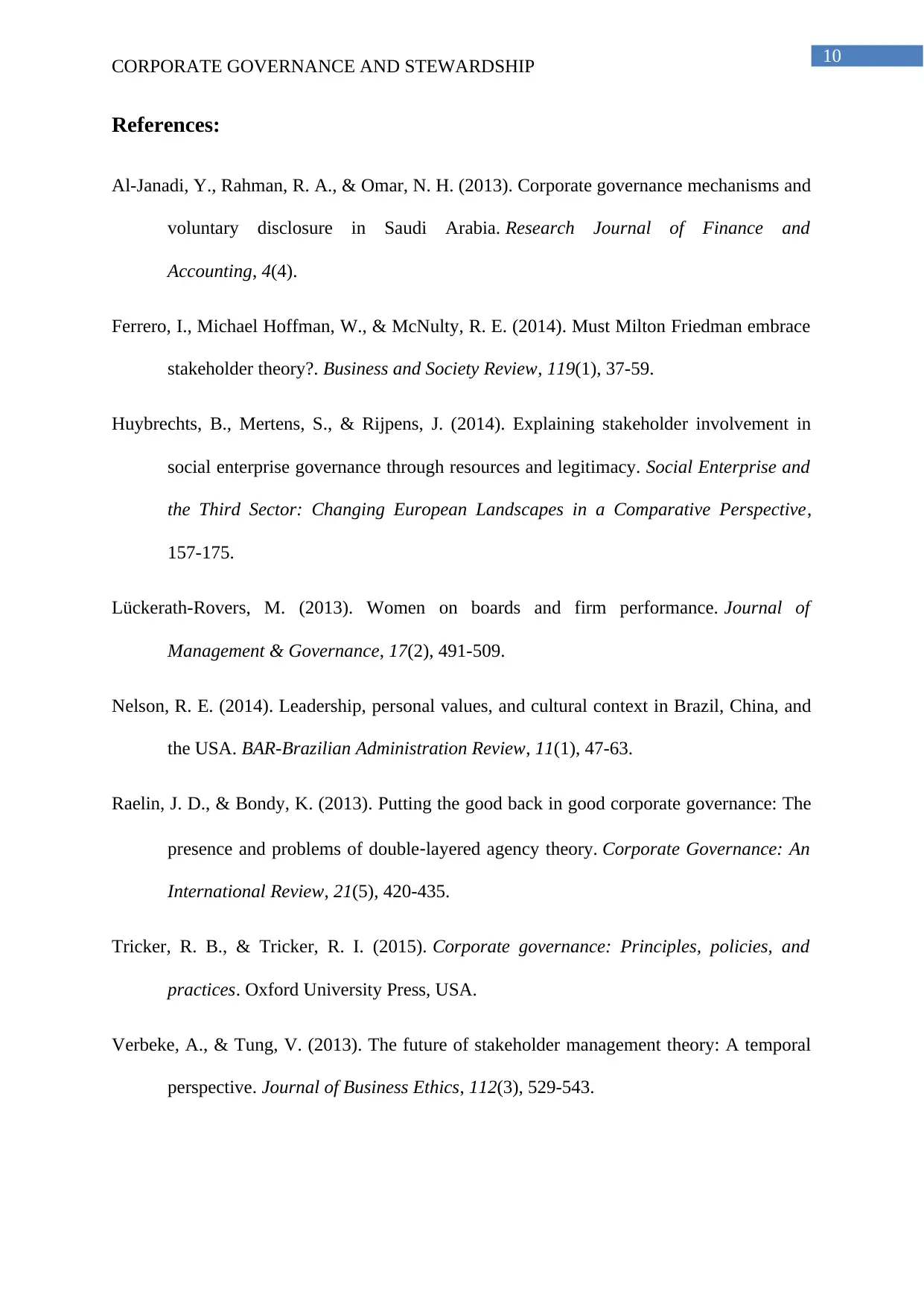
10
CORPORATE GOVERNANCE AND STEWARDSHIP
References:
Al-Janadi, Y., Rahman, R. A., & Omar, N. H. (2013). Corporate governance mechanisms and
voluntary disclosure in Saudi Arabia. Research Journal of Finance and
Accounting, 4(4).
Ferrero, I., Michael Hoffman, W., & McNulty, R. E. (2014). Must Milton Friedman embrace
stakeholder theory?. Business and Society Review, 119(1), 37-59.
Huybrechts, B., Mertens, S., & Rijpens, J. (2014). Explaining stakeholder involvement in
social enterprise governance through resources and legitimacy. Social Enterprise and
the Third Sector: Changing European Landscapes in a Comparative Perspective,
157-175.
Lückerath-Rovers, M. (2013). Women on boards and firm performance. Journal of
Management & Governance, 17(2), 491-509.
Nelson, R. E. (2014). Leadership, personal values, and cultural context in Brazil, China, and
the USA. BAR-Brazilian Administration Review, 11(1), 47-63.
Raelin, J. D., & Bondy, K. (2013). Putting the good back in good corporate governance: The
presence and problems of double‐layered agency theory. Corporate Governance: An
International Review, 21(5), 420-435.
Tricker, R. B., & Tricker, R. I. (2015). Corporate governance: Principles, policies, and
practices. Oxford University Press, USA.
Verbeke, A., & Tung, V. (2013). The future of stakeholder management theory: A temporal
perspective. Journal of Business Ethics, 112(3), 529-543.
CORPORATE GOVERNANCE AND STEWARDSHIP
References:
Al-Janadi, Y., Rahman, R. A., & Omar, N. H. (2013). Corporate governance mechanisms and
voluntary disclosure in Saudi Arabia. Research Journal of Finance and
Accounting, 4(4).
Ferrero, I., Michael Hoffman, W., & McNulty, R. E. (2014). Must Milton Friedman embrace
stakeholder theory?. Business and Society Review, 119(1), 37-59.
Huybrechts, B., Mertens, S., & Rijpens, J. (2014). Explaining stakeholder involvement in
social enterprise governance through resources and legitimacy. Social Enterprise and
the Third Sector: Changing European Landscapes in a Comparative Perspective,
157-175.
Lückerath-Rovers, M. (2013). Women on boards and firm performance. Journal of
Management & Governance, 17(2), 491-509.
Nelson, R. E. (2014). Leadership, personal values, and cultural context in Brazil, China, and
the USA. BAR-Brazilian Administration Review, 11(1), 47-63.
Raelin, J. D., & Bondy, K. (2013). Putting the good back in good corporate governance: The
presence and problems of double‐layered agency theory. Corporate Governance: An
International Review, 21(5), 420-435.
Tricker, R. B., & Tricker, R. I. (2015). Corporate governance: Principles, policies, and
practices. Oxford University Press, USA.
Verbeke, A., & Tung, V. (2013). The future of stakeholder management theory: A temporal
perspective. Journal of Business Ethics, 112(3), 529-543.

11
CORPORATE GOVERNANCE AND STEWARDSHIP
Wanyama, D., & Olweny, T. (2013). Effects of corporate governance on financial
performance of listed insurance firms in Kenya. Public policy and administration
research, 3(4), 96-120.
Wheelen, T. L., Hunger, J. D., Hoffman, A. N., & Bamford, C. E. (2017). Strategic
management and business policy. Pearson.
CORPORATE GOVERNANCE AND STEWARDSHIP
Wanyama, D., & Olweny, T. (2013). Effects of corporate governance on financial
performance of listed insurance firms in Kenya. Public policy and administration
research, 3(4), 96-120.
Wheelen, T. L., Hunger, J. D., Hoffman, A. N., & Bamford, C. E. (2017). Strategic
management and business policy. Pearson.
⊘ This is a preview!⊘
Do you want full access?
Subscribe today to unlock all pages.

Trusted by 1+ million students worldwide
1 out of 12
Related Documents
Your All-in-One AI-Powered Toolkit for Academic Success.
+13062052269
info@desklib.com
Available 24*7 on WhatsApp / Email
![[object Object]](/_next/static/media/star-bottom.7253800d.svg)
Unlock your academic potential
Copyright © 2020–2026 A2Z Services. All Rights Reserved. Developed and managed by ZUCOL.





